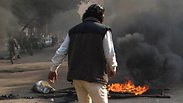
Rights campaigners and lawyers described Monday's ruling as the biggest mass death penalty handed out in Egypt's modern history. The sentences capped a swift, two-day mass trial in which defense attorneys were not allowed to present their case, drawing wide public and international criticism.
"The mass imposition of the death penalty after a trial rife with procedural irregularities is in breach of international human rights law," UN human rights spokesman Rupert Colville told a news briefing in Geneva on Tuesday.
Related stories:
The swift verdicts and the harsh sentences stunned human rights activists and raised fears that the rule of law is being swept away in the crackdown waged by the military-backed interim government against ousted president Mohamed Morsi's Musim Brotherhood since his overthrow last July.
But on Tuesday, the same court in Minya, south of Cairo, opened another mass trial of Islamist suspects, with 683 defendants - including the Muslim Brotherhood's top leader - facing an array of charges, from murder and inciting violence to sabotage.
The charges in Tuesday's proceedings also stemmed from rioting last August sparked by the security forces' storming of two Brotherhood sit-ins in Cairo that killed over 600 people.
The dispersal of the protest camps came weeks after the military overthrew Morsi following days of massive protests in which millions demanded he step down for abusing power.
Only 68 of the 683 defendants were in the dock on Tuesday. The rest are being tried in absentia. A handful of other defendants held in the case, including the Brotherhood's spiritual leader Mohammed Badei and other senior figures who are jailed in Cairo, were not present at the trial in Minya. Authorities cited security reasons for not bringing them to the hearings.
Defense lawyers in the case boycotted Tuesday's proceedings in a protest over Monday's death penalties handed by Judge Said Youssef, who was also presiding over the session Tuesday.
Khaled Fouda from the lawyers' syndicate in Minya, held a press conference to announce the protest.
"As lawyers, we haven't seen anything like what happened here yesterday in our entire professional lives and we will not see anything like it until our deaths," he said.
Defense lawyer Yasser Zidan, one of those boycotting the proceedings, said that despite the absence of the suspects' lawyers, Judge Youssef did not postpone the trial - another grave violation of due process.
"This is just another disaster," Zidan said. "This judge smashed the rock of justice with his own hands. He is inventing a new law."
Zidan added that the lawyers have filed a suit against the judge, demanded his removal. He said that according to the law, a court is obliged to postpone a session in the absence of defense attorneys and until new lawyers are assigned to the case.
The defendants were brought to court in prison trucks under heavy security measures. In addition to Badei, top Minya Brotherhood officials such as Mamdouh Ammar and lawmaker Mohammed Marzouk were listed among the defendants but it was not immediately clear if they were in court Tuesday.
The 68 were arrested following an August attack on a police station in the town of el-Adawa, when an angry crowd of pro-Morsi supporters stormed a police station to steal weapons, looted government buildings and carried out acts of "sabotage" against the state security, according to the charges. The defendants are also charged with the killing of two policemen and attempt murder of five people, including a Christian resident.
In Minya, roads around the court were blocked by cement blocks and metal barricades, manned by security forces and masked special forces. Armored vehicles patrolled the streets and shops in the vicinity of the court were shut down.
Security forces kept small groups of protesters, including relatives of the defendants, and traffic away from the area.















